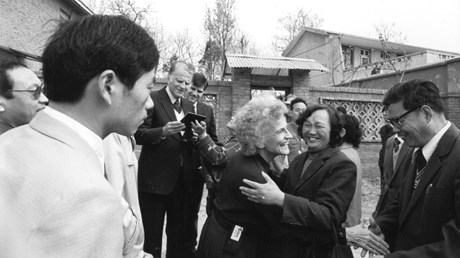Graham preached behind the Iron Curtain, driving his critics crazy.

The Billy Graham of the 1950s reflected the political mood of the United States of that era. His visceral anticommunism expressed itself during the Greater Los Angeles crusade of 1949 in his assessment of the looming Soviet threat.
"Sleek Russian bombers," he said, were poised to strike America. "Do you know," he thundered at wide-eyed listeners, "that the Fifth Columnists, called Communists, are more rampant in Los Angeles than any other city in America?" Communism, he said, "is a religion that is inspired, directed, and motivated by the devil himself who has declared war against Almighty God."
For years, Graham stayed true to that course as a fire-breathing patriotic American orator. But by 1992, he was paying a respectful visit to one of the most tyrannical communist regimes on earth: North Korea. He made comments about the North Korean dictator that made many people roll their eyes in wonder. Kim Il-sung, Graham observed, was "a gentle and logical thinker. There are statues of him all over the place. The people there really do love him."
Well, the people probably "really did" love Joseph Stalin, and Mao Zedong, and other communist tyrants of the 20th century. To demonstrate anything less might have secured a lifetime pass to their country's labor camp system. So Graham's views changed over time. How did this happen? And why?
Change in Strategy
The answer is not that Graham actually changed his view of what communism was. Until his dying day, he believed that communism was a malevolent attempt to usurp the sovereignty of God on earth.
But he changed in how he thought Christians should behave towards Communists—the people, not the ideology—and in …
Source: Christianity Today Most Read